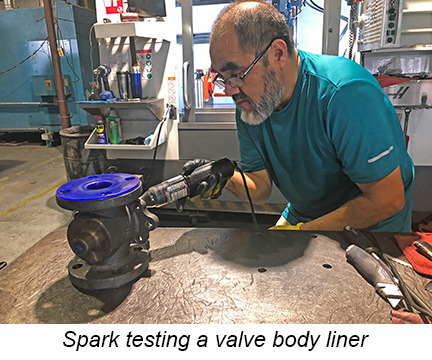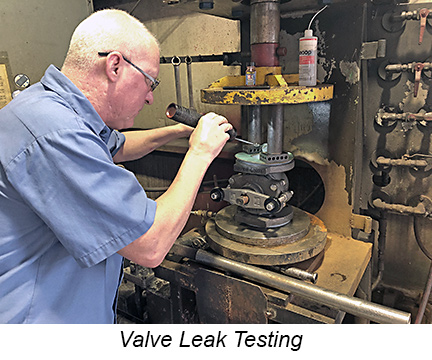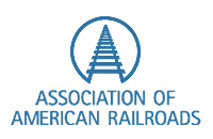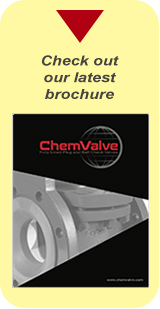Quality Assurance Program
ChemValve conducts a comprehensive Quality Assurance Program to verify key performance attributes of 100% of the valves we produce. All production employees are trained on the ChemValve Quality Assurance program annually, with additional training whenever new or updated procedures are implemented. Additionally, employees who perform leak testing must be NDT Level II certified.
The ChemValve Production, Inspection, and Test Plan defines seven hold points from incoming inspection to pack and ship. Included at these hold points are visual inspections, dimensional verifications, spark tests, and verification of parts and documents. The final test following valve assembly includes a hydrostatic test to verify the pressure containing capability of the valve, one or more leak tests using water and/or gas, and for plug valves verification of operating torque. Below are explanations of select tests:
 • Spark Test – The liner integrity is checked on every lined part using an electro-static discharge “spark” tester at three points during production: post-molding, post-machining, and pre-assembly. The entire liner surface is tested at a minimum of 40,000 volts to identify any voids, cracks, or pinholes which indicate a breach of the liner.
• Spark Test – The liner integrity is checked on every lined part using an electro-static discharge “spark” tester at three points during production: post-molding, post-machining, and pre-assembly. The entire liner surface is tested at a minimum of 40,000 volts to identify any voids, cracks, or pinholes which indicate a breach of the liner.
• Hydrostatic Body Test – Each assembled valve is tested with water pressurized to a minimum of 1.5 times the maximum rated pressure of the valve.
 • Hydrostatic Leak Test – Each assembled valve is tested with pressurized water for seat and if applicable stem leaks. Test pressure varies with the model of valve.
• Hydrostatic Leak Test – Each assembled valve is tested with pressurized water for seat and if applicable stem leaks. Test pressure varies with the model of valve.
• Gas Leak Test – For select plug valves, including valves approved for rail tank car applications, a leak test using gas is conducted to ensure a bubble-tight shut off at the seat and stem.
• Torque Test – The operating torque of each plug valve is measured to verify the plug break torque is less than 75% of the published break torque specification of the valve.
AAR Certification
 The ChemValve facility is certified as having met the requirements of the Association of American Railroads Quality Assurance Program as specified in M-1003 for the manufacture and qualification of tank car service equipment (C4m). The ChemValve 790 plug valve design has been approved by the AAR for use on rail tank cars. Also, ChemValve has received the approval of the Technical Standards and Safety Authority of Canada, and is a member of The Chlorine Institute.
The ChemValve facility is certified as having met the requirements of the Association of American Railroads Quality Assurance Program as specified in M-1003 for the manufacture and qualification of tank car service equipment (C4m). The ChemValve 790 plug valve design has been approved by the AAR for use on rail tank cars. Also, ChemValve has received the approval of the Technical Standards and Safety Authority of Canada, and is a member of The Chlorine Institute.


